Frontline workers are employees who provide an essential service or key public service; this includes firefighters, nurses, police, and teachers. Our communities depend on them, and like all of us, their lives have changed dramatically during this pandemic. Here are some of their stories on what it has been like in their positions during the pandemic.
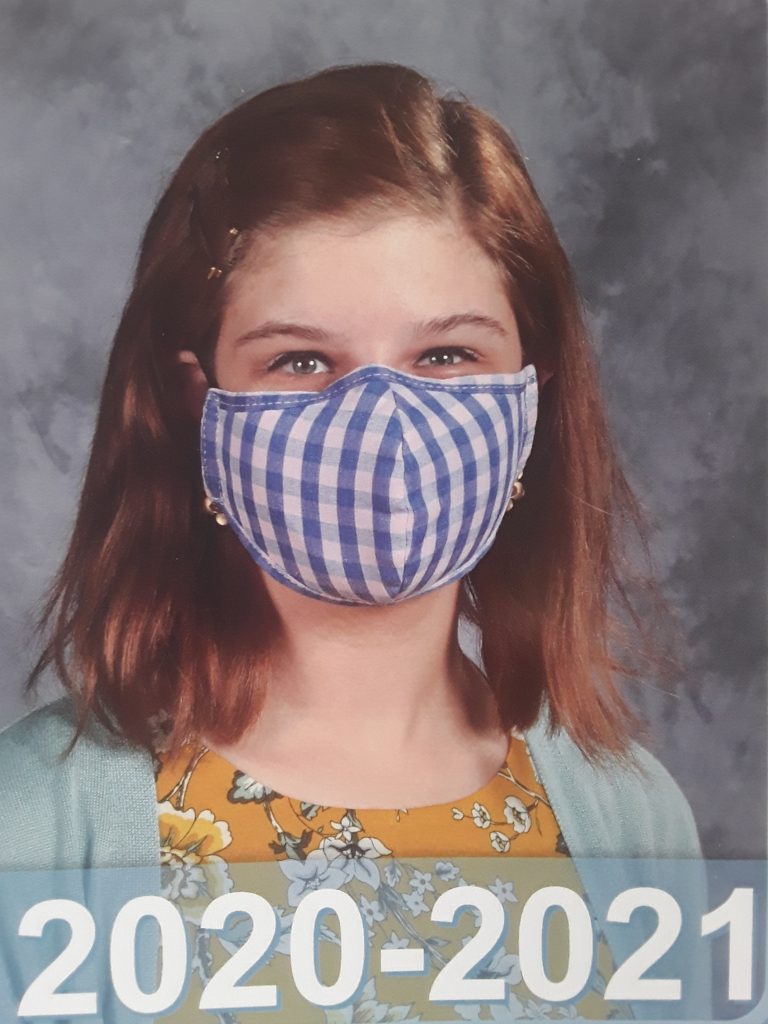
Noel (Skrbec) Flamia ’17, Clare, Michigan
Hello! My name is Noel Flammia and I am a 4th-5th grade special education teacher (both online and in person) for Clare Public Schools. Throughout the country, teachers (public, private, and homeschool) are experiencing the effects of our current pandemic. People often wonder what it’s like to teach during a pandemic? Parents who are partnering with their child’s public school teacher while navigating through the online school experience, private school teachers, and public school teachers all agree that education has changed tremendously since last March.
Educators of all types would commonly describe teaching as overwhelming, challenging, stressful, and exhausting. Personally, as a teacher of special education students with varying educational needs, I would agree. There have been numerous barriers that have challenged the flow of education that we have enjoyed for so long such as the shift to online learning (notably stressfully sudden and overwhelming in March 2020), blending online and in person learning during the 2020-2021 school year, masks, quarantine, outbreaks, social-emotional trauma, and fear. All of the previously mentioned barriers combine to create an environment that is unpredictable and can often leave teachers feeling like there’s always one more thing to add to their to-do list. Additionally, teachers often ride the edge of sanity as they give everything that they have to their craft, spend countless hours on their job, and try to focus on family. It can be challenging to juggle everything and still find time to practice healthy habits and self-care.
The barriers and feelings are not unique to teachers; janitors, secretaries, administrators, paraprofessionals, student teachers, teacher aides, bus drivers and cafeteria and maintenance staff, parents, students, and the community all feel the strain that COVID-19 has brought. However, wherever there is struggle there is also triumph. Among other things, teachers have brought innovation, kindness, grace, and love into teaching like never before. Wellness checks, non-educational Zoom sessions, and mind blowing lessons have been brought to fruition during this pandemic. We have modeled and given survival skills to our students and community. Perseverance, creativity, adaptability, and so many more life skills are at the heart of every day. Personally, this has been one of the most authentic examples of the learning process for me. I think that it is stressful for teachers to go through the learning process on such a large scale with failure and repetition in the mix. Showing students that we have to fail to succeed as well as adapt to move forward is so powerful. I have failed and improved multiple times during my teaching journey and this pandemic has given me the opportunity to transform my craft into something more. I am overwhelmed but grateful. To continue moving forward, grace must be plentiful for everyone involved, perseverance and innovation must continue through the learning process, and there must be more outlets to practice self-care.
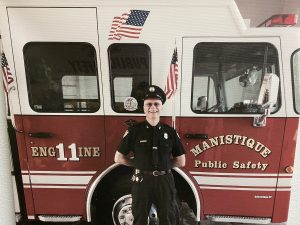 Rev. Fr. Ben J Paris ’83, Manistique, Michigan
Rev. Fr. Ben J Paris ’83, Manistique, Michigan
Employer: Diocese of Marquette/Manistique Volunteer Fire Department/Doyle Township Fire-First Responders
Position : RC Priest/FireFighter/Emergency First Responder
Things have been relatively difficult during the pandemic and this is due to a number of factors. Initially, it affected my ministry in Church when we had to limit the number of people who could attend weekly Mass (services) at the parish and mission. Also, as a member of the Mi Mort team through the Michigan Volunteer Registry, I never knew when and if we were going to be mobilized to report to a region in the state where our services were needed. Thankfully, so far that has not happened. In pre-pandemic times, we were not under alot of stress as we are today. The economy as well as the ‘mood’ of the community (not to speak of the state and nation) were very much more relaxed. Yet, now there is much tension in these areas. However, with the distribution of the vaccine and the hope that it engenders, it seems that life is starting to return to a sense of normalcy on the periphery at least. I am able to have people in Church again and that truly helps from a ministerial point of view. Looking at it from a religious perspective, many people feel that they need the Lord, and our Church (as well as others) provides a ‘sanctuary’ if you will from the pandemic and other problems that they are now facing. From a public safety perspective, I and my fellow first responders are ‘on duty’, but luckily we have not faced insurmountable situations that we cannot handle. So, it has been an interesting, troubling, yet workable year for us. I still maintain my perspective and am able to do so. Having had the coronavirus vaccine, I am a big advocate for this and hope that all people will be able to receive it when they are able to. In the meantime, I pray for the world and an ultimate and, hopefully, rapid end to the pandemic and all of the ravages that have come about as a result of it.
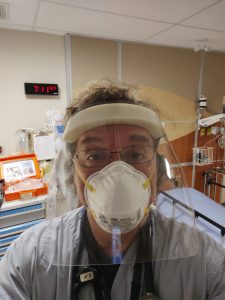 Ed Pilon, MD ’91, Toronto, Ontario
Ed Pilon, MD ’91, Toronto, Ontario
Employer: Self-employed
Position : ER Physician
As we enter the second year of dealing with the SARS-CoV-2 pandemic, the effects of this protracted strain on health-care workers and the system is evident. We were dealing with significant levels of burnout in health care pre-pandemic, and the problem has been compounded over the past year. We continue to support each other the best we can, and continue to hold out hope that better days are ahead. The numbers are trending in the right direction presently, but the emergence of several variants has many of us very worried about an even-worse “third wave”. In the meantime, all we can is carry on each day, looking after our patients the best that we can.
I have worked at ER’s in Toronto (Unity Health), rural SW Ontario and eastern Nova Scotia over the past year, and invariably I get to work with incredible people who show up every day, do their jobs well and then go home to look after their own families too. I am humbled and honored to work with them.
Please continue to heed the advice of your local PH authorities, follow good infection-control practices, get vaccinated and protect and look out for each other.
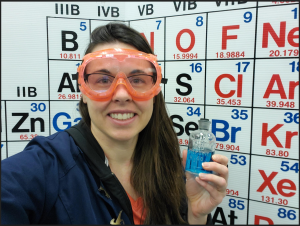
Rebecca Missler ’04, North Pole, Alaska
Teaching through COVID Chaos.
March 6th 2020 was a Friday. It was the end of our 3rd quarter and an early-out so students were excited and classes were short. My AP Chemistry students were attempting to make batteries from pennies and vinegar. I was attempting to get videos of them working to submit for my National Boards certification. Everyone left that day expecting to be back in the classroom in a week.
A week later the world was a different place. Teachers reported back to school but students were given an extra week off by our Governor. Teachers were told to start figuring out how to teach remotely. On Tuesday teachers again reported to school but were abruptly told to go home and take all personal belongings with them.
Spring was tough. It felt like an exceptionally long and cold spring but we kept busy learning to use Zoom and troubleshoot tech problems from our homes. Teachers got creative with at-home assignments and attempts at labs, I even tried using my shower as a giant white board. We tried our best to continue our lessons but as the weeks went by fewer and fewer students were logging in to class. The district then decided that grades would not count for quarter 4 so after that decision there was even fewer students tuning in.
The semester ended with a successful virtual graduation though, we were able to film students crossing our auditorium stage by themselves and then piece the videos together so it appeared as a seamless graduation video that aired on the local channels. It wasn’t in-person with hundreds of cheering people in a huge arena, but it was better than nothing.
When school let out for summer, I think we all assumed we would be back to school as normal come fall, but slowly, it became clear that this would not be the case. In Alaska school usually starts in mid-August, but it wasn’t until late September when the few buses arrived with special needs students and students with no internet.
Fall semester was difficult, because although we were now used to remote teaching and were now way more schooled in technology, teachers had a hard time making connections with students since we weren’t in-person. While most students logged in to class, few students turned their video on or talked. Teachers tried requiring they show their face, but then the lagging would be too bad and it would get distracting. Some teachers had ‘bring your pet to school day’ or ‘bring your stuffy to school day’ just to get students to turn their cameras on and participate.
We stayed remote throughout the first 2 quarters, but in January 2021 our newly elected school board demanded students be allowed to return for 3rd quarter even though we were in the ‘red zone’ still. About 60% of our student chose to come back and although we were excited for them to return, we were anxious, especially our teachers so close to retirement who were not quite old enough to get the vaccine yet. So far, we’ve been lucky and have not been shut down, however each day we pack up like we won’t be able to return tomorrow. We are just 2 weeks away from spring break 2021 and I have students who have said they don’t want to go home for break because they fear they won’t be able to come back again. I try to reassure them that our local numbers are almost out of the red zone, but no one knows for sure.
I praise my students often for their ability to adapt and overcome. They’ve learned how to roll with so much change, so much chaos this year. My students have also shown so much empathy. I am continually impressed with their patience as teachers try to battle with sharing screens to students in class and at home simultaneously. Everyone’s ability to adapt and overcome gives me great hope.
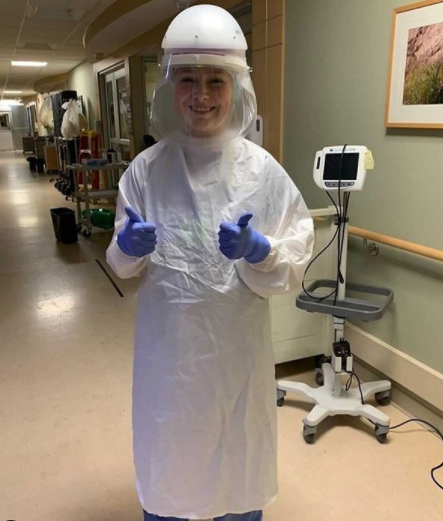 Kaitlyn Thebo ’20, Traverse City, Michigan
Kaitlyn Thebo ’20, Traverse City, Michigan
I’m currently working in the Cardiothoracic ICU and COVID unit at Munson in TC! Things are going great! I have been trained as a critical care nurse, a thought that was kinda scary considering I am a new grad, but definitely felt prepared for thanks to LSSU!
It has been difficult starting in the nursing profession during a pandemic. Nurses are truly the frontline and I’ve been taking in as much knowledge I can and also providing compassionate care for my patients, especially those with COVID-19. It is an uncertain and difficult time currently, but I cannot imagine choosing any other profession than nursing.
David Ault ’87, Sault Ste. Marie, Ontario
Employer: Sault College/Ministry of Transportation Ontario
Position : Professor /Certified Driver Examiner Ont Government
What has it been like for you in your position during this pandemic? How have things changed from your work pre-pandemic?: Online teaching classes from home of approximately 50 students. As a Driver licence examiner- in car, we use PPE highly protective masks and face shields, along with temperature testing.
Susan (Abramson) Sliger ’86, Sault Ste. Marie, Michigan
Employer: War Memorial Hospital
Position : Sr. Human Resources Director
Since March, 2020, our world in healthcare at War Memorial Hospital has dramatically changed. In the early planning months, before Chippewa County had higher numbers we were focused on planning and preparing to care for our community during the COVID pandemic. Unfortunately, due to shut downs of some services, we had to temporarily lay off about 150 employees of the hospital. We tried to utilize our staff in other areas as much as possible to avoid further cut backs. We had to establish strict screening stations at all main entrances of the hospital and shut down all other access points. The one thing that did not change, was our teamwork and compassion of each other. Everyone is willing to do whatever it takes to get the job done.
Fortunately as COVID numbers have improved we were able to bring back all the employees and are currently focusing on hiring for vacant positions. Shortages of staff makes it difficult to support the units and leaders. We are thankful for the support of our team, co-workers, and our community!
